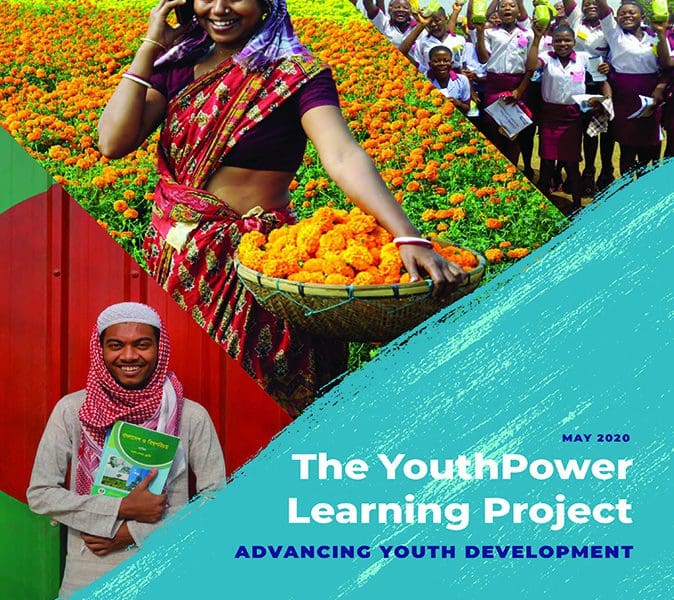
YouthPower Learning
2015 - 2020
U.S. Agency for International Development (USAID), Making Cents International
United States of America (the)
Adolescent Wellbeing and Youth Development, Adolescents and Youth
Cassandra Jessee
May 2020 marked the culmination of a 5-year USAID-funded project led by Making Cents International—YouthPower Learning—for which ICRW served as the lead research partner. The project aimed to build the evidence base the global community needs to understand and implement positive youth development (PYD) approaches around the world, and explore cross-cutting approaches to PYD.
What did we set out to do?
- Build the evidence base the global community needs to understand and implement positive youth development approaches around the world
- Establish a strong learning network committed to PYD—a collaborative space that transcends organizational and sector silos
- Provide mentorship, support and capacity building to carry out PYD initiatives
- Respond to USAID’s renewed call for unbiased impact and performance evaluations of the agency’s programs, as well as for increased use of research to improve program planning and results
What methods did we use?
Under YouthPower Learning, ICRW led research, evaluations, and events designed to build the evidence base and inform the global community about how to help young people pursue their aspirations and contribute to the creation of more peaceful and prosperous communities.
Grounded in an agreed-upon PYD definition and framework, ICRW spearheaded the research for both the Systematic Review of PYD Programs in Low- and Middle-income Countries and PYD Measurement Toolkit—two seminal works to come out of the project. In May 2020, the consortium released its final report, which details key learnings and resources from the five-year initiative.
Additionally, ICRW supported Making Cents International in fostering an inclusive, audience-specific and demand-driven cross-sectoral Youth Learning Network (on www.youthpower.org) and communities of practice. More specifically, ICRW served as a co-champion of the Gender and PYD community of practice through collective sharing and learning about what works, how to measure efforts, and how to support application of knowledge. ICRW also provided research assessment and evaluation expertise for mission level activities.
Our Conclusions
Through the project, ICRW delved more deeply into under-researched issues such as gender-related drivers of poor adolescent mental health; the importance of engaging family members around adolescent reproductive health matters; and why peers and safe spaces in programming are critical. A key finding from our research on these issues is the need to create a more supportive and enabling environment to achieve desired change.
The cumulative impact of this work is that the development community is much better positioned to center youth as partners in development while utilizing new evidence and promising practices to engage young people as meaningful contributors to development outcomes.
Moving forward, continuing to surface and fill in the knowledge gaps is essential. With this in mind, YouthPower Learning led on developing a PYD Learning Agenda, which offers a blueprint for USAID and the broader youth development community to address critical evidence gaps and explore untapped opportunities related to PYD. ICRW will continue to align its research to address key gaps, particularly for vulnerable and marginalized populations.
Featured Publications
Key Staff
Cassandra Jessee is a Director and Senior Advisor at ICRW who for the past five years served as the Director of YouthPower Learning, leading efforts to generate and disseminate knowledge about the implementation and impact of PYD and cross-sectoral approaches in international youth development.
Dr. Laura Hinson currently serves as a Social and Behavioral Scientist at ICRW, where she works to identify and reduce barriers to sexual and reproductive health for men, women, adolescents and other marginalized populations.
Meroji Sebany is a Gender and Health Specialist with ICRW. She provides technical assistance on a range of research and evaluation projects focused on sexual and reproductive health, youth development, couples’ relationship dynamics, gender-based violence and HIV/AIDS.
"One of the major shifts resulting from this body of work is that the development community is no longer asking why we should engage youth as partners in development, but rather how to bring forward new evidence and promising practices that support youth as leaders in improving development outcomes. This is a huge step forward and critical in reimagining our world post-COVID-19."

